新北京课改版六年级下册小学英语 Unit 2 单元知识点小结
六年级下册英语第二单元知识点总结
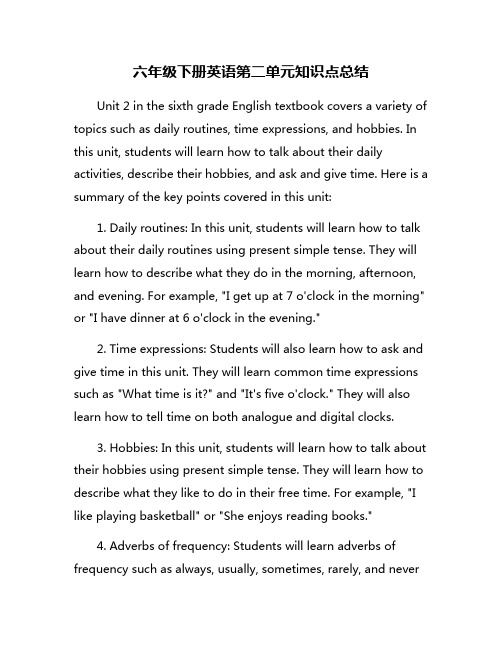
六年级下册英语第二单元知识点总结Unit 2 in the sixth grade English textbook covers a variety of topics such as daily routines, time expressions, and hobbies. In this unit, students will learn how to talk about their daily activities, describe their hobbies, and ask and give time. Here is a summary of the key points covered in this unit:1. Daily routines: In this unit, students will learn how to talk about their daily routines using present simple tense. They will learn how to describe what they do in the morning, afternoon, and evening. For example, "I get up at 7 o'clock in the morning" or "I have dinner at 6 o'clock in the evening."2. Time expressions: Students will also learn how to ask and give time in this unit. They will learn common time expressions such as "What time is it?" and "It's five o'clock." They will also learn how to tell time on both analogue and digital clocks.3. Hobbies: In this unit, students will learn how to talk about their hobbies using present simple tense. They will learn how to describe what they like to do in their free time. For example, "I like playing basketball" or "She enjoys reading books."4. Adverbs of frequency: Students will learn adverbs of frequency such as always, usually, sometimes, rarely, and neverto talk about how often they do certain activities. For example, "I always brush my teeth before bed" or "She rarely goes shopping on weekends."5. Phrases for invitations and suggestions: Students will also learn how to make invitations and suggestions in this unit. They will learn phrases such as "Would you like to come to my house for dinner?" and "How about going to the movies this weekend?"Overall, Unit 2 is a comprehensive unit that covers a range of important topics related to daily routines, time expressions, and hobbies. By the end of this unit, students should be able to confidently talk about their daily activities, hobbies, and make invitations and suggestions in English.。
最新北京版小学英语六年级下册单元知识总结全册

最新北京版小学英语六年级下册单元知识总结全册本文档总结了最新的北京版小学英语六年级下册的单元知识内容。
Unit 1 School life本单元主要介绍了学校生活的相关主题,如学校设施、教室用品等。
主要知识点包括:- 学校地图及地点介绍- 学校设施,如图书馆、音乐室、美术室等- 教室用品,如黑板、书包、钢笔、铅笔、课本等Unit 2 My day本单元主要介绍了日常生活中的活动及时间表达方式。
主要知识点包括:- 日常起居活动,如起床、刷牙、吃早餐等- 时间表达方式,如数字时间、时间段等- 一天不同时间的活动安排Unit 3 My family本单元主要介绍了家庭生活的相关主题,如家庭成员、家庭环境等。
主要知识点包括:- 家庭成员及称呼- 家庭环境,如家具、颜色等- 家庭活动,如吃饭、看电视等Unit 4 My city本单元主要介绍了城市生活的相关主题,如城市交通、地标建筑等。
主要知识点包括:- 城市交通工具及用途- 城市地标建筑介绍- 城市的基本特征介绍Unit 5 Food and drink本单元主要介绍了食品和饮料的相关主题,如饮食惯、食品种类等。
主要知识点包括:- 饮食惯及健康饮食知识- 食品和饮料种类介绍- 点餐和付款的相关表达方式Unit 6 Our world本单元主要介绍了地理和自然环境的相关主题,如世界各地、动物和植物等。
主要知识点包括:- 世界各地及地理位置介绍- 动物和植物种类介绍- 简单的地理和自然环境常识以上是六年级下册的各单元知识点的简要介绍,希望本文档能够帮助您更好地掌握小学英语知识。
北京版六年级英语下册重点总结

北京版六年级英语下册重点总结本文档是对北京版六年级英语下册的重点内容进行总结,旨在帮助学生回顾所学知识并加深理解。
以下是该教材下册的重点内容概述:Unit 1: My School Life- 介绍了关于学校生活的词汇和句型,如描述学校设施和课程的单词和短语。
- 引导学生谈论个人学校生活,包括日常活动和喜好。
Unit 2: My Family- 研究关于家庭成员和家庭活动的词汇和句型。
- 学生能够用简单句描述自己的家人,并谈论家庭成员之间的关系和活动。
Unit 3: My Hobbies- 研究关于兴趣爱好的词汇和常用句型。
- 学生能够谈论自己的兴趣和爱好,并理解其他人的兴趣爱好。
Unit 4: My Daily Routine- 研究描述日常活动的词汇和句型,如表示时间和频率的词汇。
- 引导学生描述自己的日常活动,并与他人交流日常规划。
Unit 5: My Neighborhood- 研究关于社区和地理位置的词汇和句型。
- 学生能够描述自己所在的社区,并介绍社区中的重要地点和服务设施。
Unit 6: My Travel Plan- 研究表达旅行计划和交通方式的词汇和句型。
- 学生能够谈论自己的旅行计划,并了解不同的旅行方式。
Unit 7: My Childhood- 研究谈论童年回忆的词汇和句型。
- 学生能够描述自己的童年和与他人分享有趣的童年经历。
Unit 8: My Future- 研究表达将来计划和职业选择的词汇和句型。
- 学生能够谈论自己的未来计划和职业梦想,并理解他人的愿望和计划。
通过复和巩固以上重点内容,学生们将提高他们的英语交流能力,并能够更自信地运用英语表达自己的想法和经历。
此外,请注意本文档的内容是根据北京版六年级英语下册的教学大纲总结而成,并没有引用无法确认的内容。
因此,建议结合教材本身以及老师的指导进行进一步的研究和复。
以上就是《(完整版)北京版六年级英语下册重点总结》的内容概述。
六年级英语下册Unit-2-知识点复习总结

六年级英语下册Unit-2-知识点复习总结六年级英语下册Unit2知识点总结Unit 2 Last weekend重点短语on Saturday morning在星期六早上in the afternoon在下午last weekend上个周末last night昨天晚上last year去年the day before yesterday前天stay at home呆在家里wash the clothes洗衣服clean my room打扫我的房间talk about谈论talk with\to和…交谈have a cold感冒watch children’s shows on TV在电视上看儿童节目go boating去划船read a magazine看杂志drink tea喝茶listen to loud music听大声的音乐taste bad尝起来坏了do something else做其它的事say sorry to him对他说抱歉get …from…从…地方拿…need another weekend还需要一个周末be happy with对…满意a broken chair一把坏了椅子all night整晚at night在晚上in the evening在晚上a lot of许多lots of许多not… at all 根本不feel well感觉舒服don’t feel well感觉不舒服重点句型1.What did you do last weekend?---I stayed at home with my brother and watched TV.2.Did you see a film last night?---Yes,I did. I saw a film about animals.3.Did you do anything else?---Yes, I did something else.4.Where did you go the day before yesterday?---I went to the park.5.How did you go there?---I went there by bus.\I took the bus there6.Who did you go camping with yesterday?---I went camping with my my parents.7.How was your weekend?---It was good\fine\great\OK. It was bad.8.Tom wanted to buy a storybook for his sister.9.He likes\enjoys listening to light\soft music.10.We had a good time in the zoo last Sunday.We enjoyed ourselves in the zoo last Sunday.11.My father fixed a broken chair yesterday.12.Thank you for staying in our hotel.13.I didn’t go to school because I had a bad cold.14.The Tv didn’t work,either.15.The Wu family were not happy with our hotel.16.I think we should say sorry to him.17.I had a busy\nice weekend.18.Taking the bus is faster than walking.19.I’m happy you feel better now.写出动词的过去式1.listen clean stay playfix work look talk wash watch want visit jump laugh help2.study cry3.plan stop trip4.live like taste change use5.am\is aredo\does have\has dogoget read hurtput drink singsitsaygivemakeseesleepfeelflyfalleatbuytakeridecansayrunwearwakecomeMy weekend was great._______ ________ your weekend?I did something else yesterday. 改一般疑问句______ you _______ ________ else yesterday?He usually sees a film on weekends.该否定句He ________ a film on weekends yesterday.I read a book last night.______ _______ you _______ last night?We went to the library on foot just now(刚才)._______ ______ you _______ to the library just now?My brother went to Kuerl the day before yesterday._______ ______ you ________the day before yesterday?We went camping last Sunday.______ ______ you go camping?Tom is taking pictures in the garden now.用yesterday 改句Tom ________ pictures in the garden yesterday.Mum ate some apples and banadas.改否定句Mum ______ ________ _______ apples ________ bananas.Jack bought some gifts, too.改否定句Jack ______ ______ ________ gifts, _________.She is going to buy me a nice comic book tomorrow.改为同义句She is going to _______ a nice comic book _______ me.There was an old building over there.改一般疑问句并做肯定回答______ there an old building over there? Yes,________ _________There were some gyms in our city last year.1.改一般疑问句并否定回答2.改否定句______ there ______ gyms in ______ city last year?---No,_______ _________. There _______ ______ gyms in our city last year.I was in Paris yesterday.改一般疑问句并做否定回答______ you in Paris yesterday?----No, I __________.I went swimming with my father last Saturday.______ ______you go ________ last Saturday?Mary went to Sanya over summer holiday.______ _______ to Sanya over summer holiday?Four people learned to ride a horse yesterday.______ ______people ______ to ride a horse yesterday? It was April 9th yesterday.______ _______ the date yesterday?It was Tuesday the day before yesterday.______ ______ _______ it the day before yesterday?We saw many grapes in Turpan last month.We saw _____ ______ ______ grapes in Turpan last month. We saw ______ ______ grapes in Turpan last month.。
新北京课改版六年级下册小学英语全册单元知识点小结
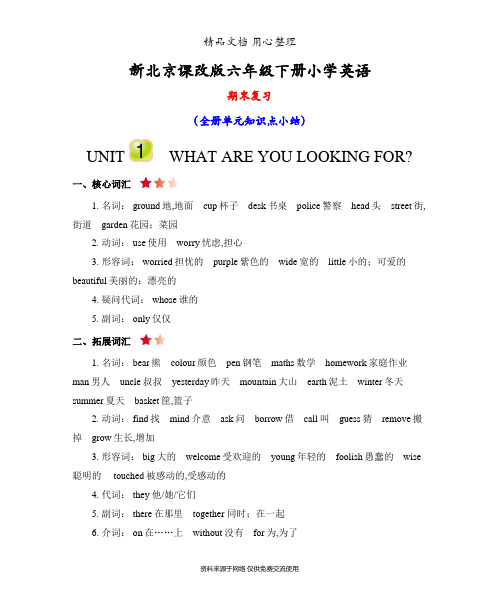
新北京课改版六年级下册小学英语期末复习(全册单元知识点小结)UNIT WHAT ARE YOU LOOKING FOR?一、核心词汇1. 名词: ground地,地面cup杯子desk书桌police警察head头street街,街道garden花园;菜园2. 动词: use使用worry忧虑,担心3. 形容词: worried担忧的purple紫色的wide宽的little小的;可爱的beautiful美丽的;漂亮的4. 疑问代词: whose谁的5. 副词: only仅仅二、拓展词汇1. 名词: bear熊colour颜色pen钢笔maths数学homework家庭作业man男人uncle叔叔yesterday昨天mountain大山earth泥土winter冬天summer夏天basket筐,篮子2. 动词: find找mind介意ask问borrow借call叫guess猜remove搬掉grow生长,增加3. 形容词: big大的welcome受欢迎的young年轻的foolish愚蠢的wise 聪明的touched被感动的,受感动的4. 代词: they 他/她/它们5. 副词: there在那里together 同时;在一起6. 介词: on在……上without没有for为,为了7. 短语: water bottle 水瓶paper cup 纸杯 pencil case 铅笔盒look for寻找on the top of在……上面三、核心句型1. — What are you looking for, Sara? 萨拉,你在找什么?— I’m looking for my water bottle. I can’t find it. 我正在找我的水瓶。
我找不到它了。
解读:此句是what 引导的现在进行时的特殊疑问句,用来询问某人正在做什么事。
举一反三:— What are you doing here? 你在这里做什么呢?— I’m waiting for my sister. 我正在等我的姐姐。
《英语》六年级下册:Unit 2单元知识点、考点归纳

《英语》六年级下册Unit 2 单元知识点、考点归纳一、单词积累clean打扫-- cleaned(clean 的过去式)打扫stay停留-- stayed (stay的过去式)停留wash洗—— washed 洗watch看——watched看have患病——had 患病sleep 睡觉——slept睡觉read读——read 读see 看见——saw看见last 上一个的yesterday 昨天before在…之前二、短语clean my room 打扫我的房间wash my clothes 洗衣服stay at home 呆在家里watch TV 看电视go boating 划船read a book 读书see a film 看电影have a cold 感冒sleep 睡觉(过去式slept)climb a mountain 爬山cooked dinner做饭cook noodles 面条三、重点句型1. How was your weekend?你周末过得怎么样?2. It was good/fine/OK,thank you.很好,谢谢!3. What did you do last weekend?你上个周末干了什么?4.I stayed at home with your grandma.我和你奶奶呆在家里.(with和谁)5. Did you do anything else?你还做了其他什么事吗?6. Yes,I cleaned my room and washed my clothes.是的,我扫了房间,还洗了衣服。
7.I want to buy the new film magazine.我想买期新的电影杂志。
8.Did you see a film?你看电影了吗?No,I didn’t .I had a cold. I stayed at home all weekend and slept.没有,我感冒了。
2020春北京课改六年级英语下册教学资料- Unit 2 知识清单

UNIT CAN YOU TELL ME MORE ABOUTHER?一、核心词汇1.名词:vacation 假期shoulder 肩膀flower 花grass 草;草坪skirt 裙子sock 短袜crayon 有色粉笔;蜡笔idea 主意;想法face 脸student 学生2.动词:feed 喂养smile 笑3.其他:nervous 紧张不安的二、拓展词汇1.名词:Canada 加拿大uncle 叔叔hobby 兴趣,爱好farm 农场spring 春天sheep 羊birthday 生日March 三月eraser 橡皮player 运动员melanin 黑色素2.动词:enjoy 喜欢,享受help 帮助buy 买sound 听起来develop 生长3.形容词:strong 强壮的beautiful 美丽的,漂亮的little 小的cute 可爱的famous 著名的kind 和蔼的round 圆形的professional 专业的,职业的darker 较暗的lighter 较淡的sunny 阳光充足的4.代词:she 她it 它everything 一切,每件事5.副词:almost 几乎,差不多before 以前,从前6.介词:during 在……期间7.短语:go fishing 去钓鱼summer vacation 暑假 a pair of 一双,一对good at 擅长三、核心句型1. Can you tell us about your uncle?你可以告诉我们一些关于你伯父的事情吗?解读:此句是由情态动词can 引导的一般疑问句,用于提出“请求、许可”,意为“……会/能/可以做……吗?”。
举一反三:—Can you give her one book?你能给她一本书吗?—Yes, I can. 是的,我可以。
2. He has broad shoulders and huge hands. 他有宽阔的肩膀和大手掌。
新北京课改版六年级下册小学英语全册单元知识点小结

新北京课改版六年级下册小学英语全册单元知识点小结Unit一、核心词汇What Are You Looking For?"1.名词:ground。
cup。
desk。
police。
head。
street。
garden2.动词:use。
worry3.形容词:worried。
purple。
wide。
little。
beautiful4.疑问代词:whose5.副词:only二、拓展词汇1.名词:bear。
colour。
pen。
maths。
homework。
man。
uncle。
XXX。
mountain。
earth。
winter。
summer。
basket2.动词:find。
mind。
ask。
borrow。
call。
guess。
remove。
grow3.形容词:big。
e。
young。
foolish。
wise。
XXX4.代词:they5.副词:there。
XXX6.介词:on。
without。
for7.短语:water bottle。
paper cup。
pencil case。
look for。
on the top of三、核心句型1."What are you looking for。
Sara?" "I'm looking for my water bottle。
I can't find it."This XXX continuous tense。
used to ask what someone is doing.XXX: "What are you doing here?" "I'm waiting for my sister."2."What's it like?"This XXX interrogative sentence using "what" to ask what something looks like.XXX: "What's your handbag like?"1."It's green," she said。
六年级下册英语二单元知识点归纳
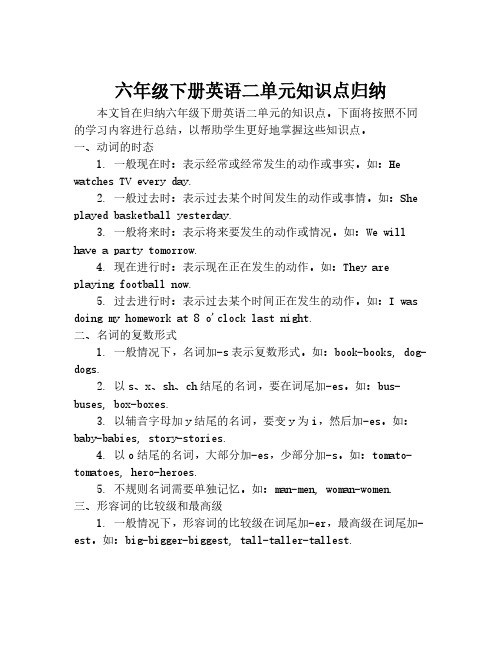
六年级下册英语二单元知识点归纳 本文旨在归纳六年级下册英语二单元的知识点。
下面将按照不同的学习内容进行总结,以帮助学生更好地掌握这些知识点。
一、动词的时态 1. 一般现在时:表示经常或经常发生的动作或事实。
如:He watches TV every day. 2. 一般过去时:表示过去某个时间发生的动作或事情。
如:She played basketball yesterday. 3. 一般将来时:表示将来要发生的动作或情况。
如:We will have a party tomorrow. 4. 现在进行时:表示现在正在发生的动作。
如:They are playing football now. 5. 过去进行时:表示过去某个时间正在发生的动作。
如:I was doing my homework at 8 o'clock last night.二、名词的复数形式 1. 一般情况下,名词加-s表示复数形式。
如:book-books, dog-dogs. 2. 以s、x、sh、ch结尾的名词,要在词尾加-es。
如:bus-buses, box-boxes. 3. 以辅音字母加y结尾的名词,要变y为i,然后加-es。
如:baby-babies, story-stories. 4. 以o结尾的名词,大部分加-es,少部分加-s。
如:tomato-tomatoes, hero-heroes. 5. 不规则名词需要单独记忆。
如:man-men, woman-women.三、形容词的比较级和最高级 1. 一般情况下,形容词的比较级在词尾加-er,最高级在词尾加-est。
如:big-bigger-biggest, tall-taller-tallest. 2. 以一个辅音字母加一个元音字母结尾的单音节词,要双写最后一个辅音字母,再加-er或-est。
如:hot-hotter-hottest, big-bigger-biggest. 3. 以y结尾的形容词,要变y为i,再加-er或-est。
北京版:六年级下lesson2课文+词汇总结

So do I 表示“我也是”
来说明前面所说的情况,也同样适用于后面的人或物。 但so do I 当中的do是根据时态和人称发生相应的变化。
4 Don't worry, Let's look for it together /təˈɡeðə(r)/ adv. 一起 5、black/blæk/黑色,黑色的 ,purple /ˈpɜːpl/紫色,紫色的 6、the same同样的、相同的 colour /ˈkʌlər/ 颜色
北京版:六年级英语下册:第2课:词汇总结
2.---I usually walk to school. ---Me too.(So do I)
me too , 适合任何情况,口语中使用要比so do I 更加广泛,。
系动词: is, am, are, was, were, do 是可以换: 助动词: does, did,
情态动词: can, could 等。
So do I 表示我也是:举例说明:
1.---I'm 7 years old. ---Me too. (So am I)
(这个句子的谓语是am) (所以这里是am不是do)
北京版:六年级下册英语 Lesson 2 Listen and say
Maomao: Why do you look so worried, Sara?
Sara:
Can I help you? Yes, please. I'm looking for my pencil case.
小学六年级英语下册《Unit2必考重点知识》归纳
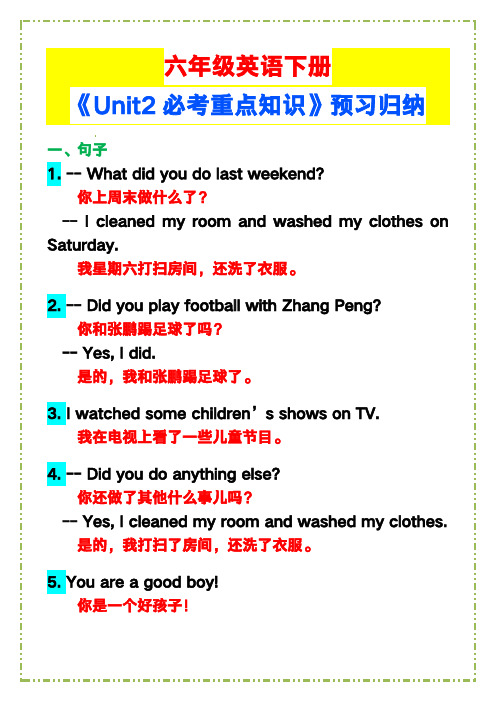
-- Yes, I did. It was great.
是的,我喜欢它。它很不错。
二、句型结构
1.-- How was your weekend?
-- It was good, thank you.
Not very good.
e.g:-- How was your weekend?
你周末过得怎么样?
六年级英语下册
《Unit2必考重点知识》预习归纳
一、句子
1.-- What did you do last weekend?
你上周末做什么了?
-- I cleaned my room and washed my clothes on Saturday.
我星期六打扫房间,还洗了衣服。
2.-- Did you play football with Zhang Peng?
4.I want to + 动词原形(+其他).
e.g:I want to travel around the world.
我想去环球旅行。
5.Was/ Were + 主语 + 形容词?
e.g:Was Timmy tired yesterday?
昨天吉米累吗?
是的,我打扫了房间,还洗了衣服。
5.You are a good boy!
你是一个好孩子!
6.-- How was your weekend?
你周末过得怎么样?
-- It was fine, thanks.
很好,谢谢。
7.-- What
-- I stayed at home and watched TV.
你和张鹏踢足球了吗?
-- Yes, I did.
六年级英语下二单元知识点总结
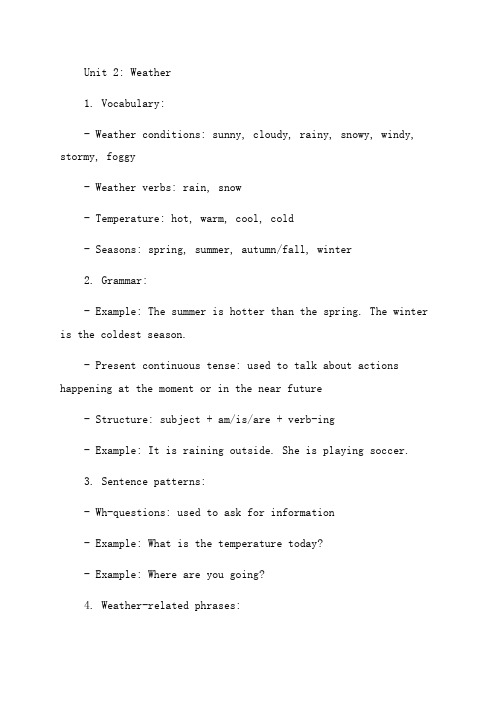
Unit 2: Weather1. Vocabulary:- Weather conditions: sunny, cloudy, rainy, snowy, windy, stormy, foggy- Weather verbs: rain, snow- Temperature: hot, warm, cool, cold- Seasons: spring, summer, autumn/fall, winter2. Grammar:- Example: The summer is hotter than the spring. The winter is the coldest season.- Present continuous tense: used to talk about actions happening at the moment or in the near future- Structure: subject + am/is/are + verb-ing- Example: It is raining outside. She is playing soccer.3. Sentence patterns:- Wh-questions: used to ask for information- Example: What is the temperature today?- Example: Where are you going?4. Weather-related phrases:- Weather forecasts: a prediction of what the weather will be like in the future- Example: The weather forecast says it will be sunny tomorrow.- Dressing for the weather: choosing appropriate clothes based on the weather conditions- Example: I need to wear a jacket because it's cold outside.- Weather expressions: phrases used to describe the weather - Example: It's raining cats and dogs.- Understanding weather reports: being able to read and understand weather reports with information about temperature, conditions, and forecasts- Identifying weather-related words and phrases in texts: being able to recognize and understand weather-related vocabulary in reading passages6. Expressing preferences:- Talk about favorite seasons and give reasons for preference- Example: My favorite season is spring because I love seeing flowers bloom.7. Cultural knowledge:- Different weather patterns in different countries and regions: learn about the weather patterns in various parts of the world and how they are influenced by geography and climate.。
六年级英语下Unit2知识点梳理

第二单元知识点梳理过去式短语1. clean---cleaned cleaned my room 打扫我的房间2. wash ---washed washed my clothes 洗我的衣服3.stay---stayed stayed at home待在家里4. watch---watched watched TV 看电视5. read---read read a book看书6. have---had had a cold 感冒7. see---saw saw a film 看电影8.drink---drank drank tea 喝茶9.do ---did did something else 做其他事情10. go---went went boating 去划船11. make---made made the beds铺床12. cook--cooked cooked the food 做饭13. visit--visited visited my grandparents 看望我的外祖父母14. play--played played football 踢足球15. study--studied studied English 学英语不规则过去式read---read have/has---had see---saw sleep---slept drink---drank do/does ---did go---went make---made am/is---was are---were get---got was not---wasn’t were not---weren’t did not---didn’t短语last weekend 上个周末last Monday上个星期一last night昨晚yesterday evening昨天晚上the day before yesterday前天feel better感觉更好talk about a lot of new films谈论许多新电影fix a broken chair 修理了一把破损的椅子taste bad 尝起来变质listen to loud music听大声的音乐enjoy our stay享受我们的入住句子1. How was your weekend? 你周末过得怎么样?It was good, thank you.很好,谢谢!2. What did you do last weekend? 你上个周末干了什么?3.I stayed at home with your grandma.我和你奶奶呆在家里.(with和谁)4.. Did you do anything else? 你还做了其他什么事吗?5.I cleaned my room and washed my clothes.我扫了房间,还洗了衣服。
六下英语二单元知识点总结

六下英语二单元知识点总结In the second unit of the sixth-grade English textbook, we delve into a variety of topics that are essential for building a strong foundation in the English language. Here is a summary of the key points covered in this unit:1. Vocabulary Expansion: The unit introduces a range of new words and phrases that are relevant to everyday life. Students are encouraged to learn these words through context and repetition to enhance their vocabulary.2. Grammar Focus: Key grammar points are introduced, such as the use of present continuous tense to describe ongoing actions, and the formation of questions using auxiliary verbs like "do" and "does."3. Sentence Construction: Students are taught how to construct more complex sentences by combining simple sentences using conjunctions like "and," "but," and "or."4. Reading Comprehension: The unit includes several short passages that are designed to improve reading skills. Students are guided to understand the main ideas and details of the texts.5. Listening Skills: Through listening exercises, students are trained to pick up key information from spoken English, which is crucial for developing their listeningcomprehension.6. Speaking Practice: Interactive speaking activities are provided to help students practice their pronunciation and fluency. Role-plays and dialogues are common features of this unit.7. Writing Skills: Writing exercises are integrated tohelp students apply what they have learned in a practical way. This includes writing simple sentences, paragraphs, and even short essays.8. Cultural Insights: The unit may also include cultural notes that provide students with insights into the customsand traditions of English-speaking countries, fostering a broader understanding of the language in context.9. Review and Assessment: Regular reviews and assessments are conducted to ensure that students are keeping pace withthe material and to identify areas that may requireadditional attention.10. Project-Based Learning: Towards the end of the unit, students may engage in a project that requires them to applyall the skills they have learned, such as creating a presentation or writing a report.By the end of this unit, students should have a solid grasp of the language skills necessary for effective communication in English and be ready to tackle more advanced topics in subsequent units.。
北京小学英语知识点总结6年级下册
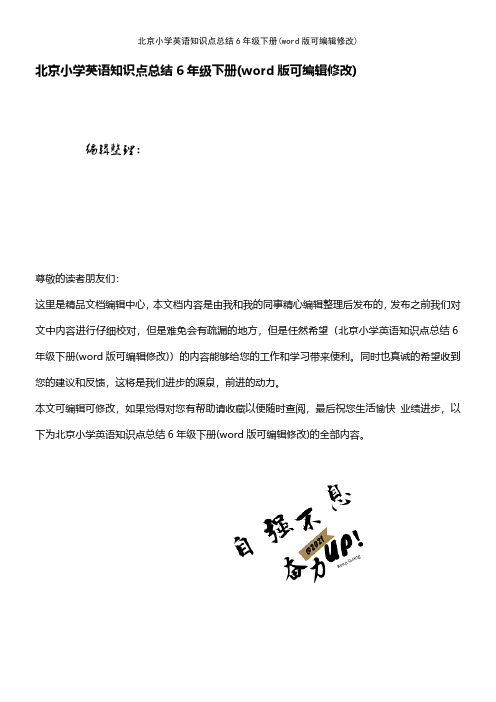
北京小学英语知识点总结6年级下册(word版可编辑修改)编辑整理:尊敬的读者朋友们:这里是精品文档编辑中心,本文档内容是由我和我的同事精心编辑整理后发布的,发布之前我们对文中内容进行仔细校对,但是难免会有疏漏的地方,但是任然希望(北京小学英语知识点总结6年级下册(word版可编辑修改))的内容能够给您的工作和学习带来便利。
同时也真诚的希望收到您的建议和反馈,这将是我们进步的源泉,前进的动力。
本文可编辑可修改,如果觉得对您有帮助请收藏以便随时查阅,最后祝您生活愉快业绩进步,以下为北京小学英语知识点总结6年级下册(word版可编辑修改)的全部内容。
六年级下册知识点Unit 1:句型:1 -What are you looking for? -你正在找什么?—I’m looking for.。
.。
.。
-我正在找。
.。
固定搭配:a few 几个Unit 2:句型:1 —Can you tell me more about。
...。
? —你能告诉我多点关于.。
.。
吗。
? —Sure。
. -当然。
固定搭配:as..。
..。
as。
..。
.和。
.。
.一样 everything will be all right一切都会好的be good at擅长Unit 3:句型:1 —Let’s live a low—crabon life. —让我们过低碳生活.固定搭配:wait a minute等一下 for example举个例子 World Earth Day世界地球日Unit 4:句型:1 -What's the weather like? —天气怎么样?固定搭配:by air坐飞机 catch a cold感冒 a runny nose流鼻涕 get wet淋湿了 get well 好起来Unit 5:句型:1 —We are going to high school! —我们要上初中了!固定搭配:in front of 在。
六年级下册英语2单元总结

六年级下册英语2单元总结介绍本文档是对六年级下册英语2单元的学习内容进行总结和回顾。
英语作为一门外语,学习起来可能会有一定的困难,但通过努力学习,我们可以提高自己的听说读写能力。
本文档将重点总结2单元所学的重要知识点,并提供一些学习方法和技巧。
重点知识点总结1. 时态在2单元中,我们学习了一些常用的时态,包括现在进行时、一般现在时以及一般过去时。
这些时态在日常英语中经常会用到,因此掌握它们对于正确使用英语语法和交流非常重要。
1.1 现在进行时现在进行时用于表示现在正在发生的动作或正在进行的状态。
它通常由“be +动词的ing形式”构成。
例如:I am studying English.(我正在学习英语。
)1.2 一般现在时一般现在时用于表示经常性的或普遍的动作或状态。
它通常由动词的原形构成,第三人称单数加-s或-es。
例如:He likes playing football.(他喜欢踢足球。
)1.3 一般过去时一般过去时用于表示过去发生的动作或状态。
它通常由动词的过去式构成。
例如:I ate an apple yesterday.(我昨天吃了一个苹果。
)2. 能力提升在2单元的学习中,我们也进行了一些能力提升的训练,以提高我们的听说读写能力。
以下是几个提升能力的方法和技巧:2.1 多听多说多听多说是提高英语口语能力的有效方法。
可以通过听英语歌曲、跟着英语录音或者参加英语口语交流活动来提升口语表达能力。
2.2 多读多写多读多写是提高英语阅读和写作能力的重要途径。
可以选择适合自己水平的英语读物进行阅读,并积累写作素材,多写作文、日记等来提高自己的写作能力。
2.3 制定学习计划制定一个合理的学习计划可以帮助我们更好地安排学习时间,合理分配各项学习任务,提高学习效率。
3. 学习体会在2单元的学习中,我收获了很多。
通过不断的练习和努力,我对英语的各种时态和语法规则有了更深入的了解。
同时,通过不断的听、说、读、写训练,我的英语口语和写作能力也有了一定的提高。
六年级下册unit 2知识点
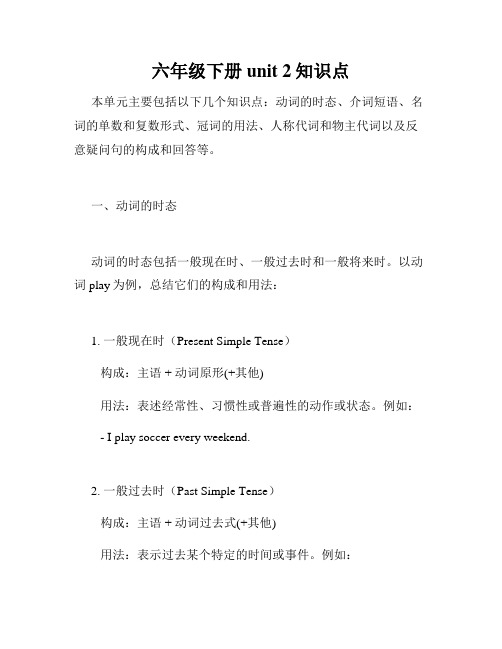
六年级下册unit 2知识点本单元主要包括以下几个知识点:动词的时态、介词短语、名词的单数和复数形式、冠词的用法、人称代词和物主代词以及反意疑问句的构成和回答等。
一、动词的时态动词的时态包括一般现在时、一般过去时和一般将来时。
以动词play为例,总结它们的构成和用法:1. 一般现在时(Present Simple Tense)构成:主语 + 动词原形(+其他)用法:表述经常性、习惯性或普遍性的动作或状态。
例如: - I play soccer every weekend.2. 一般过去时(Past Simple Tense)构成:主语 + 动词过去式(+其他)用法:表示过去某个特定的时间或事件。
例如:- She played tennis yesterday.3. 一般将来时(Future Simple Tense)构成:主语 + will + 动词原形(+其他)用法:表示将来发生的动作或状态。
例如:- They will play basketball tomorrow.二、介词短语介词短语在句子中作状语,用于修饰动词或形容词。
常见的介词短语有in front of、next to、on the left/right、under、behind等。
例如:- The book is on the table.三、名词的单数和复数形式1. 一般情况下,名词的复数形式在词尾加-s,例如:books、teachers、desks等。
2. 以s、x、sh、ch或o结尾的名词,在词尾加-es构成复数形式,例如:buses、boxes、brushes、watches等。
3. 以辅音字母+y结尾的名词,变y为i,再加-es构成复数形式,例如:ladies、berries、cities等。
4. 一些名词的复数形式不规则,例如:children、mice、feet等。
四、冠词的用法冠词分为定冠词(the)和不定冠词(a/an)。
2020春北京课改六年级英语下册教学资料- Unit 2 知识清单

UNIT CAN YOU TELL ME MORE ABOUTHER?一、核心词汇1.名词: vacation假期shoulder肩膀flower花grass草;草坪skirt裙子sock短袜crayon有色粉笔;蜡笔idea主意;想法face脸student学生2.动词: feed喂养smile笑3.其他: nervous紧张不安的二、拓展词汇1.名词: Canada加拿大uncle叔叔hobby兴趣,爱好farm农场spring春天sheep羊birthday生日March三月eraser橡皮player运动员melanin黑色素2.动词: enjoy 喜欢,享受help帮助buy买sound听起来develop生长3.形容词: strong强壮的beautiful美丽的,漂亮的little小的cute可爱的famous著名的kind和蔼的round圆形的professional专业的,职业的darker较暗的lighter较淡的sunny阳光充足的4.代词: she她it它everything一切,每件事5.副词: almost几乎,差不多before以前,从前6.介词: during在……期间7.短语: go fishing去钓鱼summer vacation暑假 a pair of一双,一对good at 擅长三、核心句型1. Can you tell us about your uncle?你可以告诉我们一些关于你伯父的事情吗?解读:此句是由情态动词can引导的一般疑问句,用于提出“请求、许可”,意为“……会/能/可以做……吗?”。
举一反三:— Can you give her one book?你能给她一本书吗?— Yes, I can. 是的,我可以。
2. He has broad shoulders and huge hands. 他有宽阔的肩膀和大手掌。
解读:此句为一般现在时的陈述句结构,用来说明主语的状态。
- 1、下载文档前请自行甄别文档内容的完整性,平台不提供额外的编辑、内容补充、找答案等附加服务。
- 2、"仅部分预览"的文档,不可在线预览部分如存在完整性等问题,可反馈申请退款(可完整预览的文档不适用该条件!)。
- 3、如文档侵犯您的权益,请联系客服反馈,我们会尽快为您处理(人工客服工作时间:9:00-18:30)。
UNIT CAN YOU TELL ME MORE ABOUT
HER?
一、核心词汇
1.名词: vacation假期shoulder肩膀flower花grass草;草坪skirt裙子sock短袜crayon有色粉笔;蜡笔idea主意;想法face脸student学生
2.动词: feed喂养smile笑
3.其他: nervous紧张不安的
二、拓展词汇
1.名词: Canada加拿大uncle叔叔hobby兴趣,爱好farm农场spring春天sheep羊birthday生日March三月eraser橡皮player运动员melanin黑色素
2.动词: enjoy 喜欢,享受help帮助buy买sound听起来develop生长
3.形容词: strong强壮的beautiful美丽的,漂亮的little小的cute可爱的famous著名的kind和蔼的round圆形的professional专业的,职业的darker较暗的lighter较淡的sunny阳光充足的
4.代词: she她it它everything一切,每件事
5.副词: almost几乎,差不多before以前,从前
6.介词: during在……期间
7.短语: go fishing去钓鱼summer vacation暑假 a pair of一双,一对good at 擅长
三、核心句型
1. Can you tell us about your uncle?你可以告诉我们一些关于你伯父的事情吗?
解读:此句是由情态动词can引导的一般疑问句,用于提出“请求、许可”,意为“……会/能/可以做……吗?”。
举一反三:— Can you give her one book?你能给她一本书吗?
— Yes, I can. 是的,我可以。
2. He has broad shoulders and huge hands. 他有宽阔的肩膀和大手掌。
解读:此句为一般现在时的陈述句结构,用来说明主语的状态。
表示主语“是……,是……样的”。
一般现在时表示经常、反复发生的动作或存在的状态。
举一反三: They have three oranges. 他们有三个橘子。
She has beautiful rings. 她有漂亮的戒指。
3. She was born in the U.S.A. on March 1st. 她3月1日出生于美国。
解读:此句是描述他人何时何地出生的句型, be born意为“出生于……”。
was
是is的过去式形式。
举一反三: The great singer was born on October 24th,1789.那位伟大的歌唱家出
生在1789年10月24日。
4. My mum bought her a skirt and a pair of socks. 我妈妈给她买了一条裙子和一双
袜子。
解读:此句是一般过去时的陈述句结构,描述在过去某个时间发生的动作或状态。
举一反三: He sold his bicycle yesterday. 昨天他卖了他的自行车。
5. What are you good at?你擅长什么?
解读:此句是询问他人特长的句型。
答句可用“… good at ….”或“…
enjoy(s) ….”句型来描述特长。
举一反三:— What are you good at?你擅长什么?
— I am good at drawing. 我擅长绘画。
四、了解句型
1. Do you go fishing in Canada, Mike?迈克,你在加拿大时去钓鱼吗?
解读:此句是一般现在时的一般疑问句。
2. I help my uncle with his farm work. 我帮我伯父在农场干活。
解读: help sb with sth 是固定词组,意为“帮助某人做某事”。
3. How old is she?她多大了?
解读:此句是专门用来询问某人年龄的句子。
4. What do you want to buy for her?你想给她买什么?
解读:此句是特殊疑问词what 引导的特殊疑问句,用来询问某人的意愿。
意为“你想/你打算……?”。
5. Everything will be all right, Sara. 一切都会好的,萨拉。
解读:该句是一个用来劝慰别人的句型,句中的will be表示将来,意为“将会”。
6. What did she do before?她以前是做什么的?
解读:此句是what引导的用来就过去发生的事情进行提问的句型,句中did是
do/does的过去式形式。
